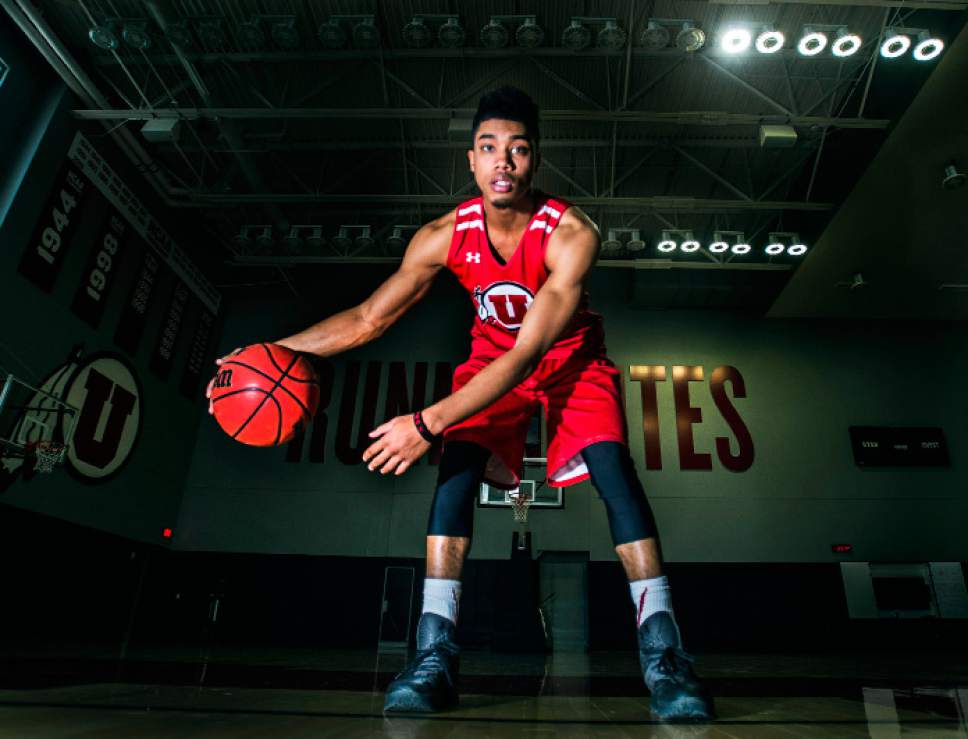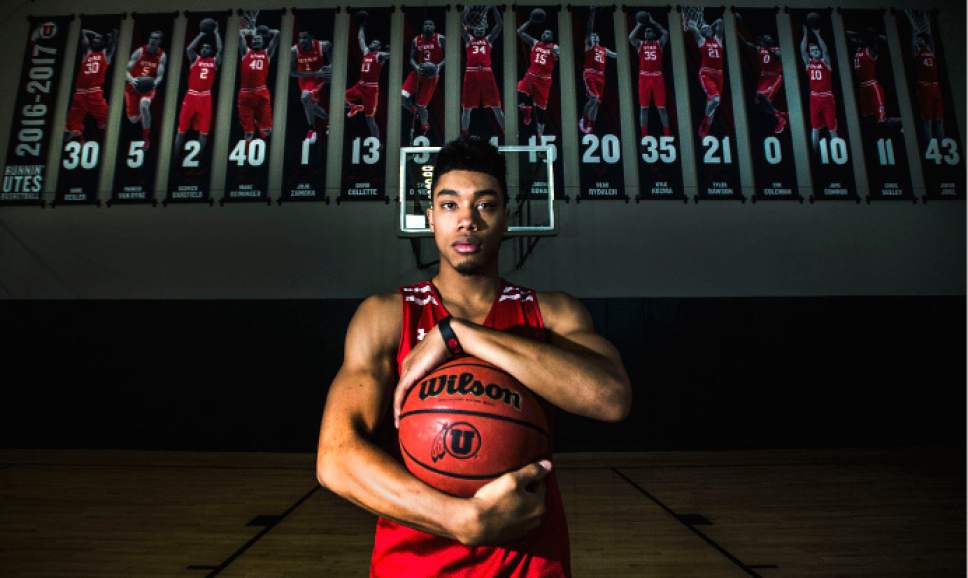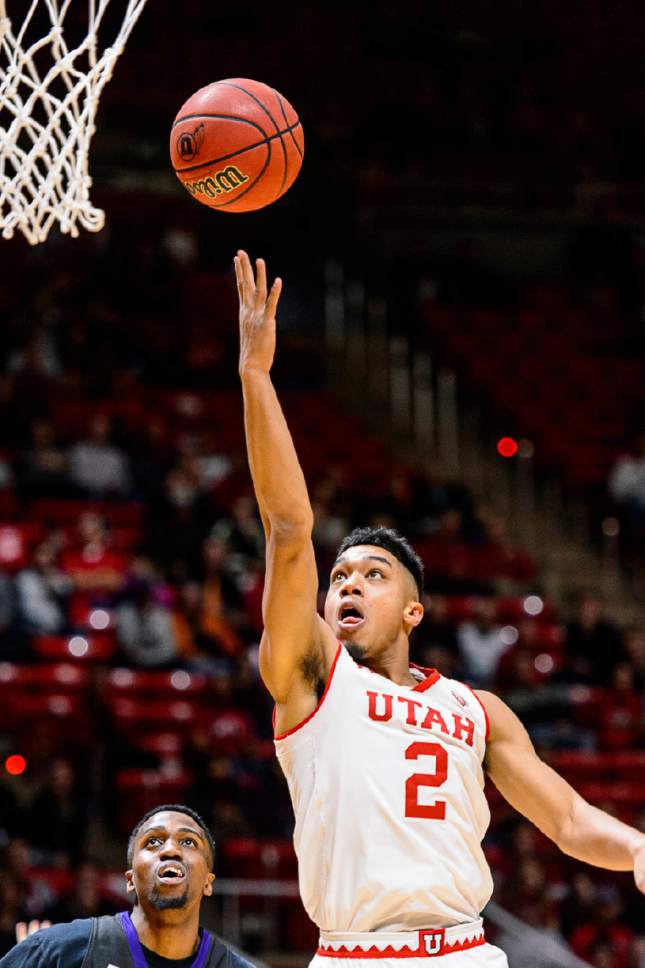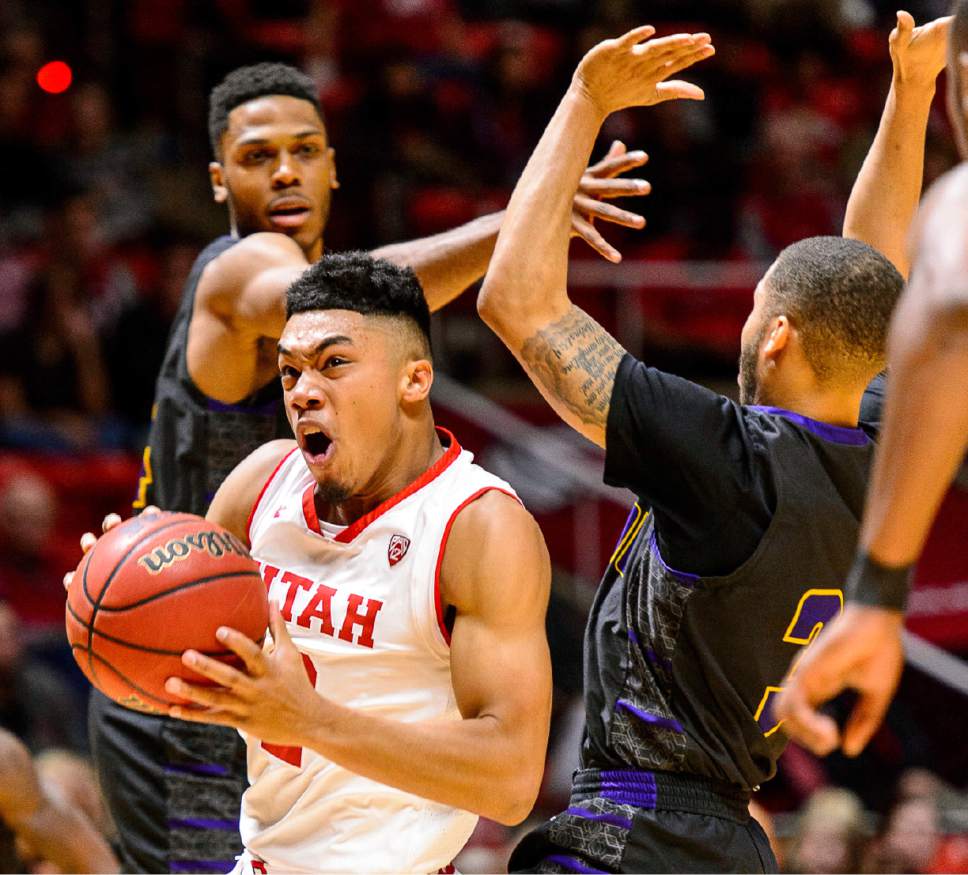This is an archived article that was published on sltrib.com in 2016, and information in the article may be outdated. It is provided only for personal research purposes and may not be reprinted.
The commute from Josh Giles' home to Centennial High School in Corona, Calif., is a little over eight miles. Southern California traffic is famously unpredictable, so the drive to and from school can be as short as 15 minutes or stretch for more than an hour.
Traffic dictated how much of an earful Sedrick Barefield got on the ride home after a bad practice. He couldn't exactly block it out and move it on when his head coach was the one driving.
"It wasn't always his favorite thing," said Giles, who now chuckles at the memory. "He would have to sit in the car with me and have his flaws described in perfect detail."
Fast-forward to last week, when 20-year-old Barefield, now a sophomore guard for the Utah men's basketball team, scored 35 points in a loss to San Francisco — more in a single game than any Ute since Keith Van Horn. He got plenty of celebratory texts and pats on the back, but Runnin' Utes head coach Larry Krystkowiak pointed to his lackluster defense, his five turnovers and no assists, and of course a loss.
Barefield, at his second college in two years and happier than he's been since graduating, takes it in stride.
"I'm just taking it all in," he said. "It's had its ups and downs. I just try to learn and not make the same mistakes twice."
No underdog story
It'd be difficult to imagine a more nurturing environment for a basketball player: Sedrick's father, Ray Barefield, is a former player at San Diego State, and a businessman-turned-high school coach. His mom, Kat Barefield, is an executive at a fitness and nutrition company who has been featured by Dr. Oz. As a prep star, Barefield played for the prestigious Compton Magic AUU team, and Corona Centennial is among California's elite high school programs.
Every advantage Barefield had in his childhood, he took on with a fervent enthusiasm that has come to define his career.
Ray Barefield had his son working on handles early: He was directed to dribble between his legs down the street back and forth without breaking stride by the time he was in fourth grade.
Giles lived down the street, so he gave the young point guard a ride to school when he joined the basketball team as a freshman. First period basketball always started at 7:30 a.m., but Giles would open the gym 45 minutes early to anyone who wanted to get in extra work. Barefield was always there.
"He's just always in the gym," Giles said. "There would have to be days where we would say, 'Sedrick, take a day off,' to the point it was a problem. Which is also why he's so good."
Barefield was good enough to catch the eye of SMU coach Larry Brown, with whom he became enamored. Brown is the only head coach to win both an NCAA (Kansas 1988) and NBA (Detroit, 2004) title; the only coach to lead three different NBA franchise to the playoffs; the developer of talent such as Danny Manning and Allen Iverson.
His one visit to Dallas was all Barefield needed — he committed to the Hall of Fame coach as a junior, despite his parents' hopes that he would go on all of his official visits. The recruiting process wore him out: He stopped taking calls from coaches and reporters.
"I wanted to play for a legendary coach like Coach Brown, somebody who has been around the game his whole life," he said. "I thought that would be a great opportunity. Obviously things don't always go the way you think they're going to go."
Wrong turn
Before Barefield signed his letter of intent, the family heard SMU had received notice that it was being investigated for NCAA violations. While Barefield's mother and Giles wanted him to explore more options, his heart was set. He signed with the Mustangs, guided by assurances from the coaching staff that the issues would be ironed out.
In September, before Barefield played a game, the NCAA laid a postseason ban and scholarship sanctions on SMU for academic fraud violations. Brown, who admitted lying during the investigation, was suspended for nine games.
The announcement changed a lot for Barefield, who was suddenly not playing for Brown, not going to the NCAA Tournament and be in a program whose future success was uncertain. Other players on the team relayed rumors that Brown, then 75, was considering leaving the program within the next year.
When he played 16 minutes in five games to start the season, Barefield's enthusiasm for SMU waned.
"There were really tough practices, games where I didn't play, and I felt like I had more to offer," he said. "I felt like I didn't have the opportunity or future with sanctions. I prayed, and I felt like it wasn't the place."
Brown had returned from suspension when Barefield informed him he wanted to transfer. Unable to convince him otherwise, Brown asked Barefield to make a list of coaches and schools he would want to play for. The family put Utah, which was closer to home and in need of a point guard, among their selections.
Brown knew Krystkowiak from NBA circles, and gave him a call to let him know one of his players would be leaving. When Barefield was released to contact other schools, Krystkowiak was the first to reach out.
This go-around, the Barefields lacked the luxury of time. SMU asked him to complete a January course, which left a week to make a decision and move. But he went on a visit to Utah, and felt it was the right place. Beyond the facilities, the Huntsman Center atmosphere and the team itself, Barefield felt his relationships with the coaching staff were ones he could trust.
"I just wanted someone who would be real with me," he said.
In July, Brown resigned from SMU after a 25-5 season in which his team had been barred from the NCAA Tournament. Tim Jankovich, who coached the Mustangs through Brown's suspension, assumed the head job.
Back on track
It would be wrong to say Utah has been what Barefield expected.
Barefield arrived in January, paying his own way for his first semester. But the teammates he became close to at the end of last season — by summer, most were gone. The Utes saw seven players transfer, which Barefield said was a bit of a stunner.
It also wasn't easy when he heard from the NCAA that his hardship waiver, which he hoped would allow him to start the 2016-17 season on time, was denied.
"A lot of days in your own thoughts," Barefield said. "I can't lie: There were days I was worried about the future. I was kind of doubtful about how things would go."
Barefield found solace both in his faith and in the roles he could play on the scout team impersonating Bryce Alford, Gabe York and other top scoring guards.
"He would do a great job of killing the first team every time he put on that scout jersey," junior Kyle Kuzma said. "He would really live up to those guys."
Now Barefield has only himself to live up to. A pair of high-scoring debuts gave him early momentum and a starting role, but he cooled in the final two games in Hawaii, scoring nine combined points and dealing with foul trouble.
Krystkowiak said he's got "a lot more evolving" to do as a player, critiquing Barefield's defense and asking him to share the ball more. But coaching, he can take. He's found something else that he didn't get at SMU: happiness.
Giles saw Barefield last Christmas, when he was getting out at SMU. He practiced against Corona's top players and looked slow, unsure, off in a way Giles described as a "beaten-up puppy."
When he watched Barefield explode against San Francisco, he sent him a text afterward: "I see you kid. You look just like you did in high school!"
"He had a different bounce in his step," Giles said. "You could see that life and energy back in him. ... He looks like he's happy again, enjoying playing."
Twitter: @kylegoon —
About Sedrick Barefield
• Son of Ray Barefield, a former San Diego State player who played Utah during the Rick Majerus years and remembers "a place with great coaches and a great atmosphere."
• Played for the Compton Magic AAU team, and was featured in the documentary "At All Costs," available on Netflix.
• As a junior, led Corona Centennial to the CIF championship game, beating a Chino Hills team led by UCLA freshman star Lonzo Ball.









